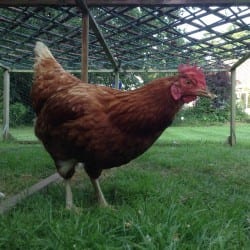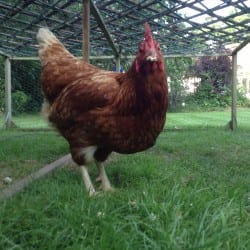Chickens Chickens Everywhere!
It seems that everyone these days is following that ‘good life’ philosophy of having (or at least thinking of having!) chickens in their back garden. My in-laws have chickens, my friends are getting chickens, the children at a nearby nursery now have chickens and I suspect that it won’t be long before my own garden is adapted into a chicken run by my wife and kids! Certainly at the veterinary practice hardly a week goes by without a chicken in the waiting room.
I wonder though how many new chicken owners keep Flubenvet in their pet medicine cabinets? Flubenvet worms chickens, in fact it is the only licensed ‘in feed’ product available to do this. If your chicken is poorly then worms should appear high on your list of possible reasons especially if you’ve never heard of Flubenvet before! It’s wrong to think that you will see worms being passed if your chicken has them, you may just notice ill-thrift or poor quality eggs, but it’s not uncommon for worms to become so numerous in infected birds that they actually cause an intestinal blockage and even death. If your chickens are kept on a permanent site in the garden then the need for worming regularly is even more critical as the area will soon become contaminated with worm eggs that are invisible to the naked eye. Chickens can become infected through carrier chickens which can spread thousands of worm eggs daily in their droppings, but wild birds can also be responsible for the contamination of the ground. In addition earthworms (a delicacy if you are a chicken!) can act as an intermediate host. In this cycle the earthworms ingest the worm eggs and then pass on the infection when they themselves are eaten by the chickens. Flubenvet wormer is a powder that is added directly to the chicken pellets (although mixing the powder with olive oil can make it easier to coat the feed) and should be used for a period of seven days at a time. To prevent worms building up you should worm regularly every three months. If you have an active worm problem then you should repeat the dose again 3-4 weeks later. It’s fine to eat the chicken eggs whilst treating with Flubenvet, so don’t let that put you off, you can also buy small packs which will treat about twenty chickens at a time. We are happy to supply the medication if you need it, please just ask at reception.
The other bottle that should be in constant demand from the chicken medicine cabinet is the ‘apple cider vinegar’ bottle. Not the pasteurised clear stuff commonly sold for salad dressing, but the organic and unpasteurised cloudy variety full of the so called ‘mother’. Apple cider vinegar is heralded in human medicine as a potential cure for anything from sore throats, to arthritis but it’s been used to help ailing chickens for years. It reportedly has antiseptic and antibacterial properties and is proven to relieve stress in chickens. Chickens that are stressed are far more susceptible to disease, so it makes sense to use apple cider vinegar during any times of stress. Stressful situations for birds can include obvious ones such as interest or attack from predators, and introducing new birds to an established group, to less obvious causes such as changes in weather conditions. Many poultry experts recommend using apple cider vinegar for a week at a time each month because of the overall health benefits it affords. The dose to administer is generally recommended to be 20ml in each litre of fresh water, but make sure you are using plastic water containers as the acid in the vinegar destroys anything galvanised!
If you aren’t using Flubenvet and apple cider vinegar regularly then I hope that helps your chickens’ egg quality and production over the next few months! Good luck with it and of course we’re happy to help if you have any concerns.
< Back to articles Estcourt Vets Devizes
Estcourt Vets Devizes
